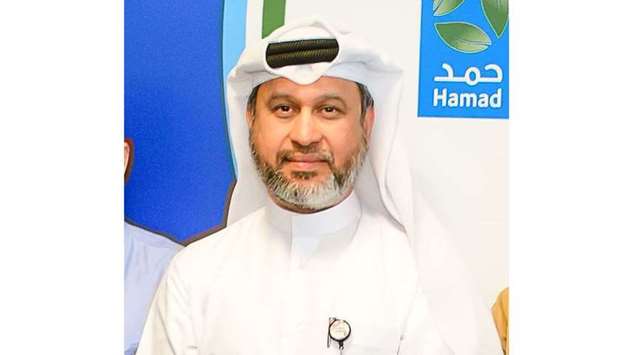Radiologists, radiographers, radiological technologists and professionals from Hamad Medical Corporation (HMC) joined their counterparts from across the world to mark International Day of Radiology (IDoR 2021), which aims to build greater awareness of the value that radiology contributes to safe patient care.
This year’s IDoR is being held under the theme: ‘Interventional Radiology – Active care for the patient’ to highlight the essential role that interventional radiology plays in treating patients. The marking of the day also aims to improve public understanding of the vital role radiologists and radiographers play in the healthcare continuum.
“This year, the International Day of Radiology is being dedicated to interventional radiology and its essential role in treating patients. Interventional radiology is a unique and growing subspecialty that helps and protects patients each and every day,” said, Dr Ahmed Omar, head of Clinical Imaging Services and chairman of Clinical Imaging Department, HMC.
According to him, interventional radiology is not just for people with cancer. “Doctors also use it for problems with blood vessels, such as narrowed arteries or blood clots. It is also a way to treat kidney and gallstones and to place central lines that go deep into the body to deliver medicine," he said.
He stated that interventional radiology allows doctor to get direct access to the part of the body that needs treatment without damaging the healthy parts. “Interventional radiology is a medical sub-specialty of radiology utilising minimally-invasive image-guided procedures to diagnose and treat diseases in nearly every organ system. It is a way to diagnose and treat cancer and other conditions without major surgery. It also makes it less likely that the patient will get risky side effects from treatment or surgery,” Dr Omar said.
He highlighted that radiology is now the key diagnostic tool for many diseases and has an important role in monitoring treatment and predicting outcome.
“Radiology has a number of imaging modalities such as plain X-rays, fluoroscopy, nuclear medicine, ultrasound, computed tomography, magnetic resonance imaging and hybrid modalities, which makes it easier to get a good look at the part of the body that radiologists need to treat,” Dr Omar said.
“Our department provides a full range of vital imaging services 24/7 throughout the week for emergent and inpatients across all HMC’s network of hospitals. Our services are available by appointment for all outpatients and some inpatients and we promptly deliver results of imaging services for clinicians to achieve diagnosis, helping in patient management and some service as treatment,” he added.
This year’s IDoR is being held under the theme: ‘Interventional Radiology – Active care for the patient’ to highlight the essential role that interventional radiology plays in treating patients. The marking of the day also aims to improve public understanding of the vital role radiologists and radiographers play in the healthcare continuum.
“This year, the International Day of Radiology is being dedicated to interventional radiology and its essential role in treating patients. Interventional radiology is a unique and growing subspecialty that helps and protects patients each and every day,” said, Dr Ahmed Omar, head of Clinical Imaging Services and chairman of Clinical Imaging Department, HMC.
According to him, interventional radiology is not just for people with cancer. “Doctors also use it for problems with blood vessels, such as narrowed arteries or blood clots. It is also a way to treat kidney and gallstones and to place central lines that go deep into the body to deliver medicine," he said.
He stated that interventional radiology allows doctor to get direct access to the part of the body that needs treatment without damaging the healthy parts. “Interventional radiology is a medical sub-specialty of radiology utilising minimally-invasive image-guided procedures to diagnose and treat diseases in nearly every organ system. It is a way to diagnose and treat cancer and other conditions without major surgery. It also makes it less likely that the patient will get risky side effects from treatment or surgery,” Dr Omar said.
He highlighted that radiology is now the key diagnostic tool for many diseases and has an important role in monitoring treatment and predicting outcome.
“Radiology has a number of imaging modalities such as plain X-rays, fluoroscopy, nuclear medicine, ultrasound, computed tomography, magnetic resonance imaging and hybrid modalities, which makes it easier to get a good look at the part of the body that radiologists need to treat,” Dr Omar said.
“Our department provides a full range of vital imaging services 24/7 throughout the week for emergent and inpatients across all HMC’s network of hospitals. Our services are available by appointment for all outpatients and some inpatients and we promptly deliver results of imaging services for clinicians to achieve diagnosis, helping in patient management and some service as treatment,” he added.

